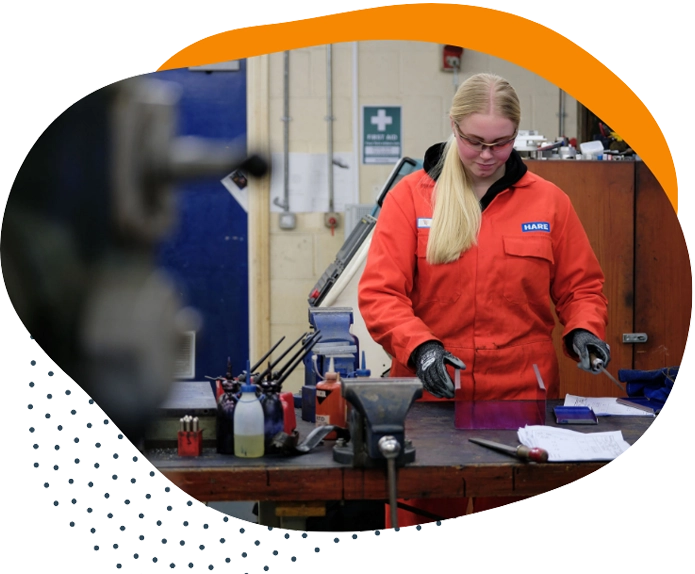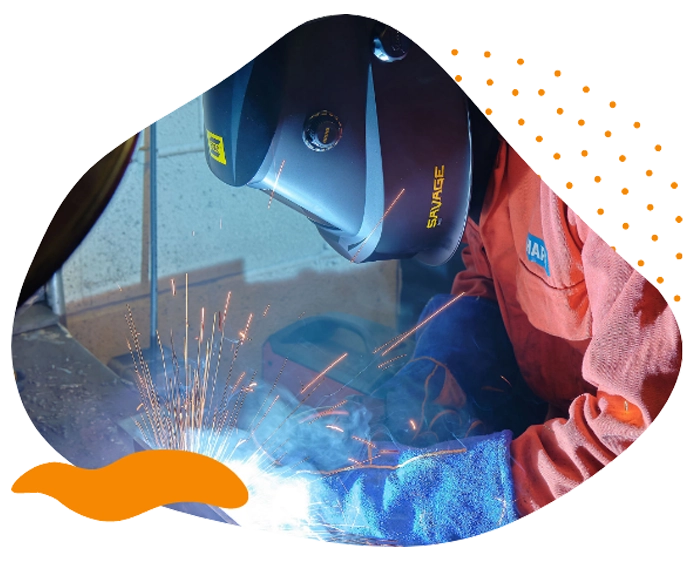An apprenticeship is a paid position where you can gain valuable training and qualifications for your chosen vocation.
A combination of on and off-the-job training you will benefit from a blend of training centre-based learning and the opportunity to use the skills you have learnt in a real, working environment.
An Apprenticeship offers…


Apprenticeships are graded in Levels, from Level 2 to Level 7. They are also sometimes categorised as Intermediate, Advanced, Higher, or Degree level.
The Level 2 Apprenticeship is for those who are aged 16 and over and are equal to GCSEs. This level of Apprenticeship provides the basic knowledge and skills for specific jobs.
There is generally no eligibility criteria for applications, however you will need to demonstrate that you have the ability to complete the training.
A Level 3 Apprenticeship is equal to A-Levels and offer more specialised knowledge and skills. It is a common next step for those who have no previous engineering qualifications, or have achieved 5 GCSEs (A*-C / 9-4) and want to progress into engineering as a career.
A Level 4 Apprenticeship is the equivalent to a Foundation Degree, a Higher National Certificate (HNC), or the first year of an undergraduate degree.
The entry requirements of a Level 3 Apprenticeship in Engineering are:
A Level 5 Apprenticeship is also classified as a Higher Apprenticeship, but are the equivalent to a full degree.
The requirements of a Level 5 Apprenticeship will be similar to a Level 4, but there may be more specific requirements from an employer.
Degree apprenticeships are new types of courses offered by universities. The Level 6 Apprenticeship gives candidates the opportunity to achieve a full bachelor’s degree, and a level 7 is an opportunity to gain a masters in your chosen subject.
As these are demanding courses, it is common to see strict requirements from employers for these apprenticeships. You will certainly need prior qualifications.
We offer 3 key Apprenticeship types here at the centre, Level 3 Apprenticeship in Engineering, Level 4 Apprenticeship in Engineering and Level 3 Apprenticeship in Team Leader/Supervisor

Different levels of Apprenticeship may require specific qualifications or eligibility criteria (see above) but, aside from that, the opportunity for an Apprenticeship is open to most people. Whether you are a mature person already in work and looking to upskill or a school leaver ready to start your career, an Apprenticeship can offer a brilliant opportunity to develop. At a minimum you should:
If you do not live in England, check out Apprenticeship options in Scotland, Wales or Northern Ireland.

Although your Apprenticeship is a paid position, it is also a legal requirement in England that you have the opportunity for formal learning within your employment hours.
You will spend 20% of your paid time ‘off-the-job’, giving you the chance for essential training needed to complete your Apprenticeship.
Off-the-job training can be either in or our of the workplace and includes the likes of:
The other 80% of your time will be spent “on-the-job” with your employer but responsibilities should be aligned to your training to help develop your practical skills. This is why it is so important to match the right apprentice with the right Apprenticeship and the right employer.
What you earn will depend on your age, Apprenticeship level, sector, employer and place of work. Your employer can choose to pay you as much as they believe suitable, but they do typically receive funding for your wages and there are minimum wage requirements they must meet:
You will need to pay for your day-to-day expenses, such as transport to work and the training centre and your lunches
